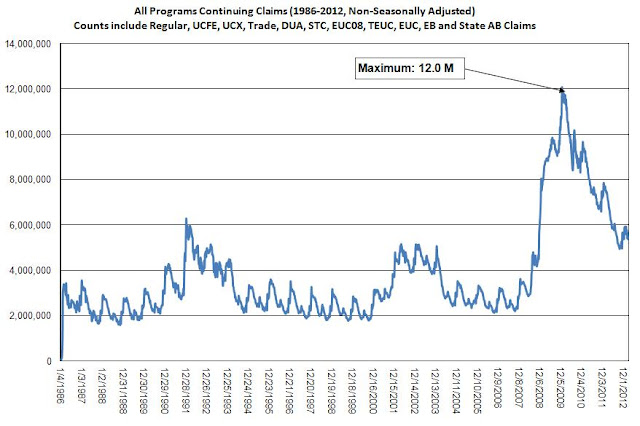"Unemployment Benefits MUST be extended!!
Unemployment benefits are already paid for two years - NOW we have to pay for three years??? Four???
When will it stop? When do you have to be responsible for yourself - after how long?
CORPORATIONS ARE MOVING OFFSHORE TO NOT PAY TAXES!!!!! Really???
So, what you are saying is our ridiculously high corporate tax rates screwed us when the business owners decided to move their business to greener pastures??? You all think there are no consequences to raising taxes... Keep raising them and watch it continue and we will lose more businesses, jobs, and tax revenue.
Corporations OUTSOURCED our jobs!!! Really?
You mean there are people in other countries who are willing to do a job you are not willing to do for much less pay and a much more desolate lifestyle? Oh, I'm sorry, did you read somewhere that because you were born in America, you had a right to make more than everyone else on the planet for doing the same thing?
Everyone in this country needs to wake up. Raising taxes HAS consequences. Companies will move offshore, entrepreneurs will CONTINUE to leave and CONTINUE to move their businesses to other locations. Unless all you people making less then $250,000 are going to start CREATING JOBS, I suggest you stop trying to make sure every corporation and ENTREPRENEUR leaves our country."
- Yahoo! Reader Comment
Disclaimer: I do not endorse, promote, or encourage anyone to read Yahoo! (or other Internet news providers) reader comments. I do admit, for cheap entertainment, I will stoop to reading comments posted below such articles. I do not find this constructive in anyway apart from occasionally finding some humorous and clever insight beneath a massive pile of trash.
This Yahoo! reader left little doubt of his disapproval of America's unemployment system. Regardless of how accurate you believe the statements are, the comment does highlight frustrations and questions surrounding our current unemployment system. Most notably:
- What should be considered adequate benefits? How much and how long should benefits be offered?
- What consequences, if any, are there of funding unemployment assistance?
During the next few posts it is my aim to provide clarity on the historical and current utilization of unemployment assistance, outline what roles I believe an unemployment system should fulfill, and breakdown specifics of both the current unemployment system and my proposed changes.
In 2012, ~$156 billion was spent providing public unemployment assistance to an average of 6 million weekly recipients. In 2012, $156 billion amounted to 4.2% of all government spending (6.8% of revenue) and 11.3% of total welfare spending. In comparison, $108 billion was spent on public food assistance in 2012. Thus, as also covered in Food Assistance Part II, I am primarily interested in modifying unemployment assistance on principle rather than for monetary purposes.
Unemployment utilization reached its peak in 2010, amounting to $235 billion spent providing aid with a record 12 million recipients the week of 1/2/2010. Prior to 2008, unemployment spending and the number receiving aid was more or less at an equilibrium as shown in the charts below. Compared to the year 2000, 2010 saw a 1017% increase in money spent and a 425% increase in recipients while America's population increased by 14.4%.
Looking at cost of expenditures to GDP standardizes costs to America's total economic production. The important note is the direction the figure is trending. An upwards trend signifies we are spending more of our productivity on unemployment assistance compared to prior years and vice versa. Between 2000 and 2010, a 698% increase in percent of GDP was realized. Currently, in 2012, our nation's unemployment system consumes 1.0% of America's GDP, up 431% from 2000.
Are such substantial increases in unemployment utilization for the better or worse? Who, if anyone, benefits or is harmed by our unemployment system? Data indicates both the number of recipients and total amount of aid recipients are receiving have increased. This growth is likely secondary to the increased duration recipients are now eligible to receive benefits as highlighted in the Yahoo! reader comment. Knowing where we have been, where we are, and where we appear to be going are all important components of analyzing not only what has and has not worked in the past, but what policies provide the greatest potential benefit for future utilization.
Next Post Topic: Gardening Part I: Overview.



No comments:
Post a Comment